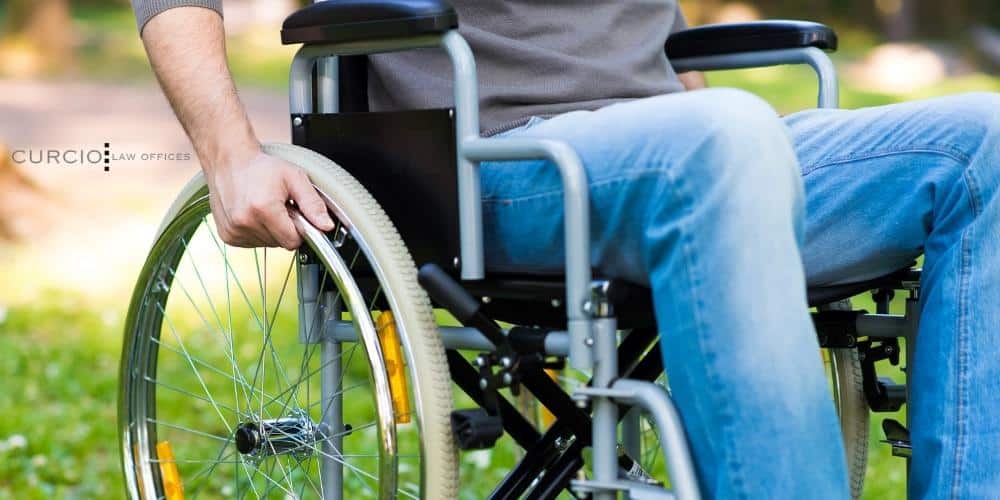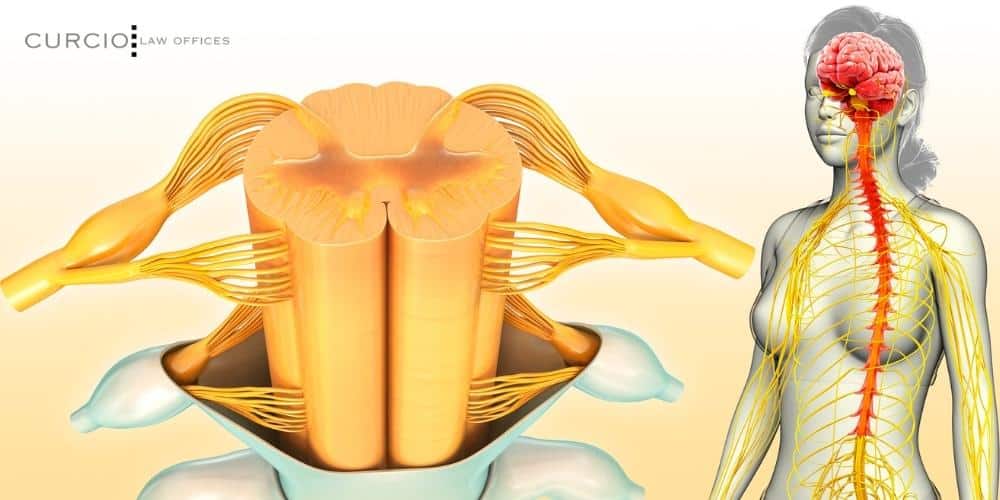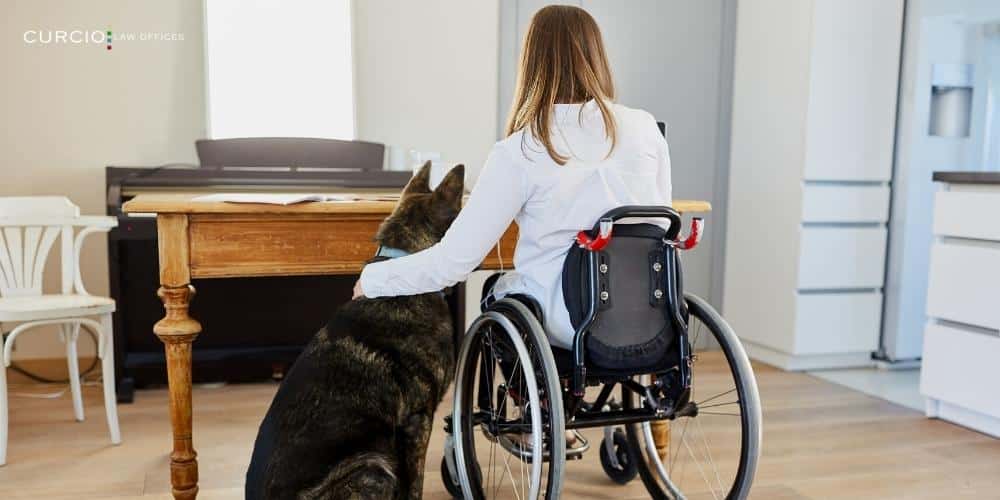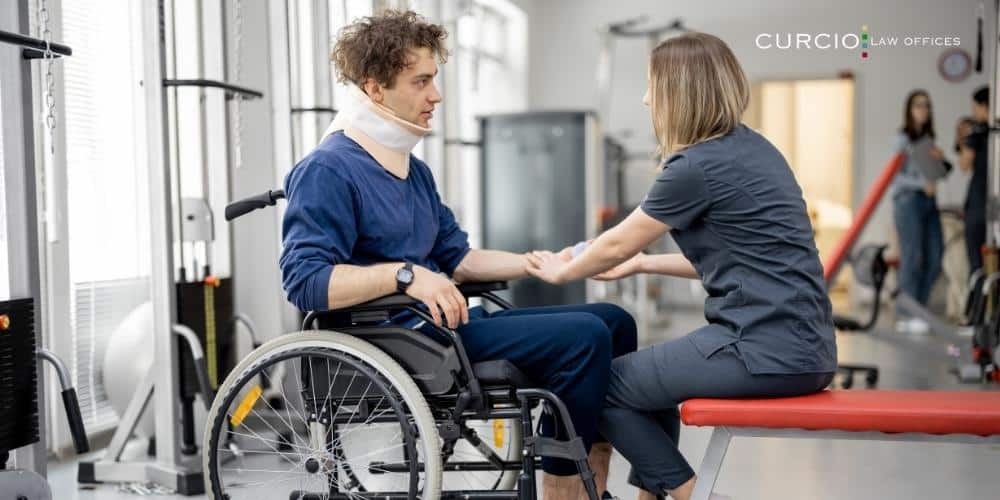CHICAGO PARALYSIS LAWYER
PRACTICE AREAS
Chicago Paralysis Injury Lawyer
Did you know some kind of motor vehicle accident causes most spinal cord injuries and paralysis cases, whether that be a car accident, semi-truck accident, motorcycle accident, etc? This level of spinal trauma is considered a catastrophic injury, and it can lead to a lifetime of debt from medical bills, physical therapy bills, lost wages, and so much more. Paralysis is physically, emotionally, and financially traumatic for most victims. Every Chicago paralysis lawyer at Curcio & Casciato recognizes this fact and wants to help.
If your spinal injuries were caused by someone else’s negligence, you have grounds to contact Chicago personal injury lawyers at our law firm.
Our Chicago personal injury lawyers have helped countless catastrophically injured people recover maximum compensation for their damages, and we can do the same for you. Call 312-321-1111 to start an attorney-client relationship with us today. Our Chicago injury attorneys offer a free consultation to all new clients.

What is Paralysis?
Paralysis is often the result of a severe spinal cord injury. A paralysis injury condition prevents victims from making voluntary movements in parts of their body or their whole body.
Paralysis occurs when there is significant damage to the central nervous system – the brain and spinal cord. Neurons, also called nerve cells, are responsible for almost all our necessary bodily functions and sensations. They send messages from the brain to the spinal cord and the rest of the body.
Motor neurons, in particular, send messages from the central nervous system to the muscles so that we can move our bodies. If spinal cord damage occurs, those messages will be interrupted, and therefore, the injured person may not be able to move.
How Many Americans Suffer From Paralysis?
According to a 2023 report, approximately 5.4 million Americans suffer from some form of paralysis.
Types of Spinal Cord Injuries
There are multiple types of spinal cord injuries that people can suffer from. The type of injury heavily depends on what kind of accident occurred and where the injury occurred in the spinal canal. For example, if someone suffered a thoracic spinal cord injury, they may suffer from paralysis in just the lower body. Meanwhile, if someone suffered a cervical spinal cord injury, they could suffer from full-body paralysis.
There are two main types of paralysis: complete spinal cord injuries and incomplete spinal cord injuries.
Complete Spinal Cord Injury
Complete spinal cord injury, also known as complete paralysis, means that the victim has lost all muscle control and sensation below their spinal cord injury. For example, let’s say a person suffers a severe injury in their cervical spine (neck). If the injury is complete, they will have no muscle control or sensation below the neck.
Incomplete Spinal Cord Injury
Incomplete Spinal Cord Injury, also known as partial paralysis, means that the victim has some sensation and control over their muscles below the spinal injuries. So again, let’s say that someone suffers a cervical spinal cord injury. If they suffer an incomplete injury, they may have some muscle control and sensation below the neck.
Contact a Chicago spinal cord injury lawyer or a Chicago back injury lawyer for more information.
Types of Paralysis
There are also several types of paralysis that people can suffer from that are often dependent on the location of the spinal cord injury. Additionally, these types of paralysis often depend on the type of accident or incident that occurred. So, some paralysis cases may be caused by a motor vehicle accident while others are caused by a stroke, for example.
Monoplegia prevents someone from moving only one of their limbs.
Hemiplegia prevents someone from moving one side of their body.
Paraplegia means that someone can’t move or feel anything from the waist down.
Quadriplegia means that someone can’t move all four limbs. The pelvic organs are generally impacted by quadriplegia as well.
Paralysis injuries are often broken down further by how the muscles are affected. For example, spinal cord injury victims can suffer from spastic or flaccid paralysis. Flaccid paralysis describes muscles that are floppy, sagging, and shrinking. Meanwhile, spastic paralysis sufferers, such as Cerebral Palsy victims, experience tight, jerky, and stiff muscles.

Common Causes of Spinal Cord Injuries Leading to Paralysis Injury
Motor Vehicle Accidents
Motor vehicle accidents caused more than 31% of spinal cord injuries since 2005.
Motor vehicle accidents are a leading cause of paralysis, often requiring the expertise of a Chicago auto accident lawyer, Chicago bus accident lawyer, or Chicago car accident lawyer. Motor vehicle accidents caused more than 31% of spinal cord injuries since 2005.
When large vehicles are involved, a Chicago semi-truck accident lawyer might be needed due to the severe impact these collisions can have. Similarly, Chicago motorcycle accident lawyers and Chicago pedestrian accident lawyers play a crucial role in representing victims of car accidents that result in life-altering spinal injuries, advocating for their rights to compensation and rehabilitation.
Train Accidents
Train accidents, due to their high-impact nature and the significant forces involved, can lead to severe injuries, including spinal cord injuries that may result in paralysis. When a train derails or collides with another object, the abrupt and forceful jolt can cause passengers and crew to be violently thrown or struck by objects, leading to trauma to the spine. The spinal cord, which is the critical pathway for transmitting signals between the brain and the rest of the body, can be damaged or severed in such incidents. Depending on the location and severity of the injury, this can disrupt the communication between the brain and various body parts, potentially leading to partial or complete loss of motor function and sensation below the site of the injury, manifesting as paralysis. The extent of paralysis can vary, with some individuals experiencing quadriplegia—paralysis of all four limbs—while others may suffer from paraplegia—paralysis affecting the lower half of the body.
If you or a loved one has suffered a severe spinal cord injury or paralysis due to a Chicago, IL train accident, be sure to contact a Chicago train accident attorney or a Chicago railroad accident attorney today.
Premises Liability
In cases where unsafe conditions on someone’s property lead to a spinal cord injury, a Chicago premises liability attorney becomes essential. These legal professionals collaborate with medical experts to establish a clear connection between the injury site and the negligent conditions, ensuring victims receive the compensation necessary for their recovery and long-term care needs. They navigate the complexities of premises liability law to hold property owners accountable for their failure to maintain a safe environment.
Medical Malpractice
Medical malpractice can result in paralysis due to errors during childbirth, chiropractic treatments, or other medical procedures. A Chicago medical malpractice lawyer, including Chicago birth injury lawyers or Chicago chiropractor malpractice lawyers, can help victims navigate their paralysis injury claim before the Illinois medical malpractice statute of limitations runs out. Chicago Cerebral Palsy lawyers are also key when negligence during the birthing process leads to conditions causing paralysis. These attorneys work diligently to cover ongoing medical costs and ensure justice for those suffering from spinal cord injuries due to medical negligence.
Catastrophic Injuries
Catastrophic injuries, such as those sustained in construction accidents or from gunshot wounds, may lead to paralysis and require the expertise of a Chicago catastrophic injury lawyer or a Chicago construction accident lawyer. These injuries can affect the spinal column and spinal cord, leading to neurological disorders and significant pain and suffering. An experienced lawyer in this field will advocate for the victim’s right to compensation for medical treatment, rehabilitation, and the profound impact on their quality of life.
If you or someone you love suffered a catastrophic injury, such as a spinal injury, from someone else’s negligence, you have grounds to contact Chicago personal injury attorneys. An experienced Chicago paralysis attorney provides a free consultation and can help you file a personal injury lawsuit against the at-fault party so that you can receive fair compensation.
Nursing Home Negligence
Nursing home negligence can manifest in many forms, from inadequate care leading to bedsores, requiring the expertise of Chicago bed sore lawyers, to serious infections that go untreated. Our Chicago nursing home infections lawyers have extensive experience litigating cases where neglect results in harmful conditions like sepsis that lead to paralysis, calling for the skills of a Chicago nursing home sepsis attorney. However, elderly patients in nursing homes most commonly suffer spinal cord injuries and paralysis from falls. If your elderly loved one has suffered numerous falls in their nursing facility, it’s time to contact a Chicago nursing home fall lawyer.
Our Chicago nursing home abuse lawyers are dedicated to fighting for the rights of the elderly, seeking justice and compensation for the pain and suffering endured due to negligence.
Complications Associated With Spinal Cord Injury
The main issue that generally stems from a spinal injury is paralysis. But a permanent lack of mobility in some (or all) body parts can cause a variety of other health complications, including:
Respiratory issues and difficulty breathing
Dysphagia, which is difficulty swallowing
Difficulty speaking
Mental health issues such as PTSD, depression, anxiety, panic attacks, hopelessness, suicidal thoughts, etc.
Chronic pain and/or tingling in the paralyzed muscles
Sexual problems such as erectile dysfunction
High or low blood pressure issues
Bedsores, which in severe cases can lead to major infections and sepsis
Circulation problems such as blood clots and deep vein thrombosis (DVT)
Loss of bowel and bladder control, which can lead to urinary tract infections (UTI), especially if paralysis victims don’t receive help with maintaining good hygiene

Can Paralysis Be Reversed?
No, spinal cord injuries and paralysis are irreversible. The damage is done, so it can’t be fixed, but it can be managed. Depending on the type of permanent paralysis suffered, many accident victims can still live a full life with ongoing medical care.
Treatment for Paralysis
Paralysis treatment varies depending on the type of accident that occurred and where the spinal injury occurred. Many paralysis victims will need surgery and a long list of medications to manage their symptoms until they are stable.
Once victims are stable, they will likely undergo some form of physical therapy to learn how to function with their limited mobility. With the right exercises and equipment, victims of paralysis can learn to strengthen the parts of their bodies they still have control over. Some victims will even need speech therapy if their type of paralysis makes it difficult for them to speak.
Most paralyzed people will need specialized equipment to help them function, such as:
Adaptive Equipment that can allow paralyzed people to drive, feed themselves, go to the bathroom, etc.
Assistive Equipment, which can help paralyzed people move around. Examples include wheelchairs, motorized chairs, scooters, canes, etc.
Prosthetic and Orthotic Devices such as braces for paralyzed limbs.
Voice Activated Technology allows paralyzed people to use their phones, computers, house lights, etc.
Proving Negligence in a Catastrophic Injury Claim
If your paralysis injury was caused by someone else’s negligence, you need a Chicago personal injury lawyer on your side to help you prove the 4 D’s of negligence. Proving that negligence occurred is crucial for building a strong case and recovering maximum compensation.
Duty of Care: Everyone owes each other a specific duty of care to promote safety. For example, drivers owe it to each other to be focused, sober, and responsible on the roads. Doctors owe it to their patients to give them the best medical care possible.
Duty Dereliction: The negligent party breached this duty of care through their actions or inactions.
Direct Cause: The person’s negligent actions or inactions directly caused a spinal cord injury and/or paralysis.
Damages: The paralyzed person suffered numerous damages for which they deserve fair compensation.
A Chicago paralysis lawyer at our law firm can help victims prove negligence through evidence such as medical records, security camera footage, police reports, witness statements, and so much more.
Our Chicago injury lawyers provide a free consultation for new clients.
Spinal Injury Compensation Payouts
Chicago paralysis lawyers can help victims file a paralysis lawsuit and seek compensation for the damages listed below.
Past and future medical costs
Past and future physical therapy costs
Caregiving expenses, if the victim is too disabled to care for themselves
Expenses for adaptive/assistive equipment, prosthetic devices, and voice-activated technology
Physical pain and suffering
Emotional distress
Loss of enjoyment of life
Mental health counseling expenses
Lost wages
Loss of earning capacity if the victim can no longer complete the same job duties as they could before
Loss of consortium
Our Chicago emotional distress attorneys can show you how to calculate pain and suffering damages and help you calculate your lost wages.

Call a Chicago Paralysis Lawyer at Curcio & Casciato Today
Catastrophic injuries are physically, emotionally, and financially devastating for both the victims and their families. Not only is the paralyzed person’s mobility changed forever, but often, so are their finances. Paralysis can result in lifelong, crippling debt due to the thousands of dollars of medical expenses that are required for treatment and rehabilitation.
Our Chicago law firm can relieve you of this financial burden through a legal claim. Our Chicago injury lawyers have helped countless personal injury victims in the Chicago, IL, area achieve some sense of the normalcy they once had before their accident. We can help you do this, too. Call a Chicago paralysis lawyer at 312-321-1111 to schedule a free case evaluation today.


